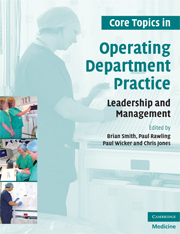Book contents
- Frontmatter
- Contents
- List of contributors
- Foreword
- Preface
- 1 Managing change in perioperative education
- 2 The role of the operating department manager within the context of the organization
- 3 Action learning: a new way of problem solving in perioperative settings
- 4 Agenda for change: what do theatre staff need to know?
- 5 The SWOT analysis: its place in strategic planning in a modern operating department
- 6 Corporate governance: setting the scene for perioperative practice
- 7 Managing different cultures: adversity and diversity in the perioperative environment
- 8 Leadership in perioperative settings: a practical guide
- 9 Management and leadership of advanced practice
- 10 Managing conflict in perioperative settings
- 11 The management and organization of emergency operating lists
- 12 Organizational culture
- 13 Development matters in the NHS; including a perioperative approach to the KSF
- 14 Equipment procurement: a purchaser's guide for theatre managers
- 15 The reflective practitioner in perioperative settings
- 16 New ways of working in perioperative practice
- 17 Damned if you do and damned if you don't: whistle blowing in perioperative practice
- 18 A manager's experience of recruitment and retention
- 19 The management of change
- Index
- References
12 - Organizational culture
- Frontmatter
- Contents
- List of contributors
- Foreword
- Preface
- 1 Managing change in perioperative education
- 2 The role of the operating department manager within the context of the organization
- 3 Action learning: a new way of problem solving in perioperative settings
- 4 Agenda for change: what do theatre staff need to know?
- 5 The SWOT analysis: its place in strategic planning in a modern operating department
- 6 Corporate governance: setting the scene for perioperative practice
- 7 Managing different cultures: adversity and diversity in the perioperative environment
- 8 Leadership in perioperative settings: a practical guide
- 9 Management and leadership of advanced practice
- 10 Managing conflict in perioperative settings
- 11 The management and organization of emergency operating lists
- 12 Organizational culture
- 13 Development matters in the NHS; including a perioperative approach to the KSF
- 14 Equipment procurement: a purchaser's guide for theatre managers
- 15 The reflective practitioner in perioperative settings
- 16 New ways of working in perioperative practice
- 17 Damned if you do and damned if you don't: whistle blowing in perioperative practice
- 18 A manager's experience of recruitment and retention
- 19 The management of change
- Index
- References
Summary
Key Learning Points
Identify the issues relating to ‘culture’ within an organization and team
Understand how the concept of culture can be applied to an organization and team
Understand the unwritten rules
Understand how culture can be influenced
Develop self-awareness within a leadership role
Introduction
There are several keys to successful leadership. One is an understanding of the critical role culture plays, particularly when implementing change and promoting innovation. Another is an awareness of how culture can be manipulated to promote a more effective and receptive learning environment. However, cultural manipulation is not easy. Furthermore, the concept is hard to define, analyse and measure (Schein 1997). The aim of this chapter is to challenge personal views about culture within both the organization and the team; uncover some of the unwritten rules; reflect on the links between culture, change management and leadership; and provide some tips for success and for empowering the development of effective leadership skills. To support the translation of theory to practice, a reflective model to aid cultural awareness will be proposed.
Throughout the chapter, reflection points have been included to aid self-awareness. The information in the boxes will allow reflection on the context of the text in terms of personal experience and position on the leadership learning continuum.
- Type
- Chapter
- Information
- Core Topics in Operating Department PracticeLeadership and Management, pp. 89 - 106Publisher: Cambridge University PressPrint publication year: 2009

